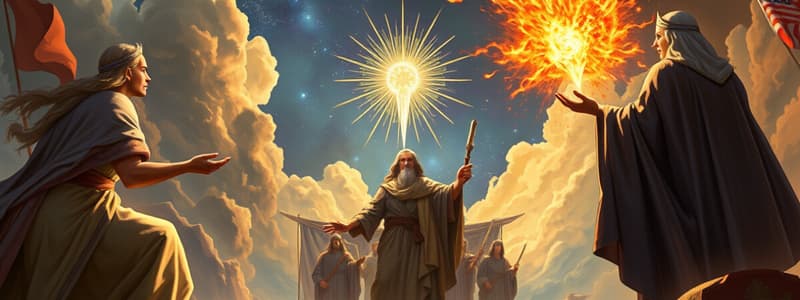Podcast
Questions and Answers
What are expressed powers?
What are expressed powers?
- Powers that are implied but not directly stated
- Powers that are voted on by Congress
- Powers granted to the government found in Article I, Section 8 (correct)
- Powers solely for warfare
What are delegated powers?
What are delegated powers?
Powers specifically described and assigned in the US Constitution.
What are implied powers?
What are implied powers?
Authoritative actions not specifically granted to Congress but considered necessary.
What is the role of the commander in chief?
What is the role of the commander in chief?
Who is referred to as the head of state?
Who is referred to as the head of state?
What does the term head of government refer to?
What does the term head of government refer to?
What is the War Powers Act?
What is the War Powers Act?
Which of the following are roles of the president?
Which of the following are roles of the president?
What are the three categories of presidential power?
What are the three categories of presidential power?
What is an executive agreement?
What is an executive agreement?
What is executive privilege?
What is executive privilege?
What is a veto?
What is a veto?
What is a pocket veto?
What is a pocket veto?
What is legislative initiative?
What is legislative initiative?
What is an executive order?
What is an executive order?
What is the White House?
What is the White House?
What is the White House Office?
What is the White House Office?
Study Notes
Powers of Government
- Expressed Powers: Found in Article I, Section 8 of the U.S. Constitution; include powers like coining money, regulating commerce, and declaring war.
- Delegated Powers: Specifically assigned powers to the federal government in the Constitution.
Types of Powers
- Implied Powers: Not specifically mentioned in the Constitution but necessary for carrying out government duties; e.g., raising an army.
- Presidential Powers: Categorized into constitutional powers (explicitly granted), delegated powers (granted by Congress), and inherent powers (necessary for the president’s role).
Presidential Roles
- Commander in Chief: The head of state responsible for national armed forces.
- Head of State: The chief public representative of a country; can also be the head of government.
- Head of Government: The highest official in the executive branch, often leading a cabinet.
Legislative Powers and Actions
- War Powers Act (1973): Limits the president's ability to commit U.S. forces to armed conflict without Congress's consent.
- Veto: Constitutional right of the president to reject legislation passed by Congress.
- Pocket Veto: An indirect veto by not signing the bill until it’s too late for legislative action.
Executive Authority
- Executive Agreement: An international agreement made by the executive branch that does not require Senate ratification.
- Executive Privilege: The president's right to withhold information from Congress or the judiciary in the interests of national security.
- Executive Order: A directive issued by the president with the force of law.
Legislative Process
- Legislative Initiative: The power to propose new laws, typically attributed to legislative bodies.
- Roles of the President: Include chief of state, chief executive, chief administrator, chief diplomat, commander in chief, chief legislator, party chief, and chief citizen.
The White House
- White House Office: A part of the Executive Office of the President, serving as the principal workplace and residence of the U.S. president since 1800.
- White House Staff: Supports the president's functions and decision-making processes.
Studying That Suits You
Use AI to generate personalized quizzes and flashcards to suit your learning preferences.
Description
This quiz covers key concepts from Chapter 12 related to expressed and delegated powers in the US government. You'll explore definitions and examples to deepen your understanding of these constitutional powers. Ideal for students looking to reinforce their knowledge of American government principles.




